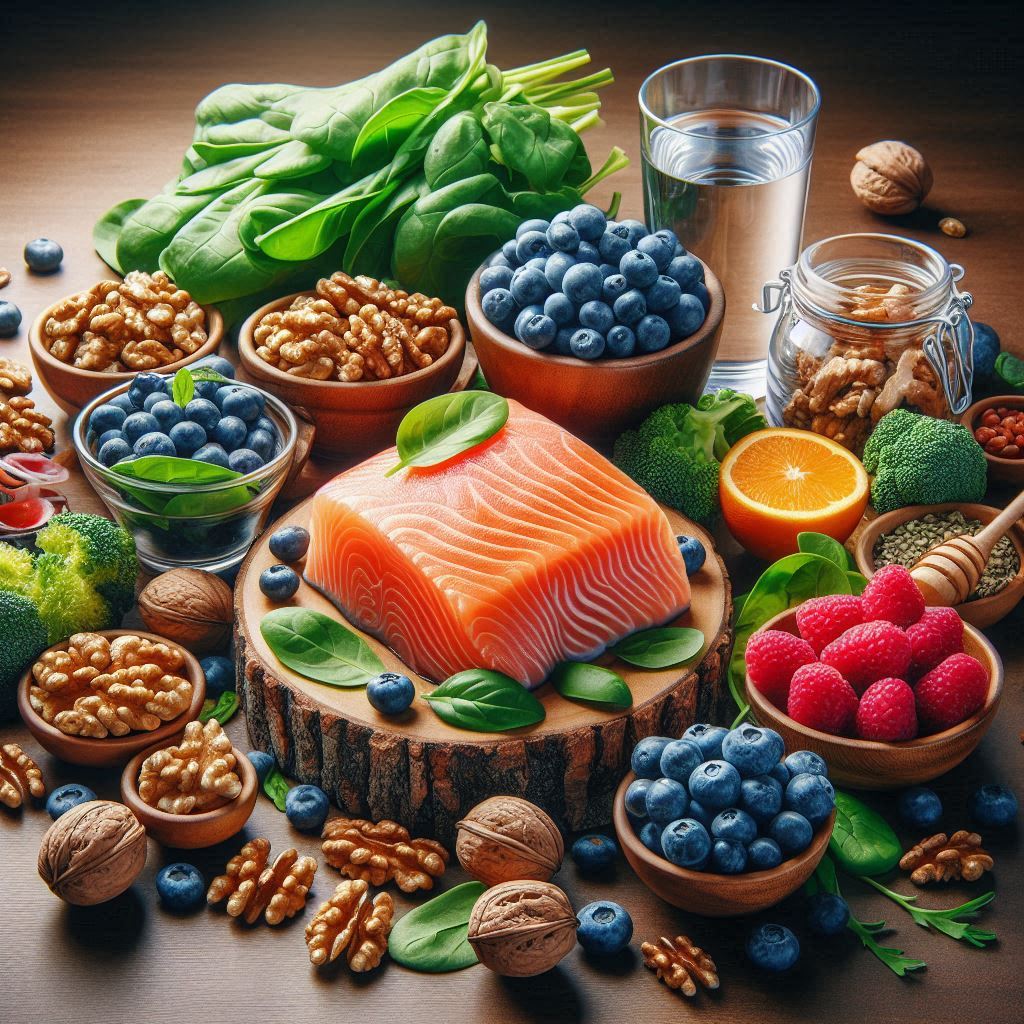
Let’s dive into something that can transform how you feel, think, and work—nutrition for better focus and brain health. From boosting memory to improving mental clarity, let’s explore some science-backed strategies to nourish your brain for peak performance.
The brain consumes about 20% of your daily energy, so it’s constantly demanding fuel— meaning if you’re not getting the right types or amount of fuel, your thinking will be affected.
Most important brain boosting nutrients:
First, let’s cover the most important nutrients for your brain:
- Omega-3 Fatty Acids: Importance for brain structure and function, sources like fatty fish (salmon, mackerel), flaxseeds, and walnuts.
- Antioxidants: Protecting the brain from oxidative stress—sources include berries, dark chocolate, and leafy greens.
- B Vitamins: Critical for neurotransmitter function and cognitive processes—found in whole grains, eggs, and leafy veggies.
- Vitamin D: Linked to mood and cognitive performance, often lacking in people’s diets—sources include fatty fish, fortified foods, and sunlight.
- Magnesium: Supports neurotransmission and reduces stress, found in nuts, seeds, and leafy greens.

Now let’s cover the best foods to get those nutrients:
1. Fatty Fish (Salmon, Mackerel, Sardines, Trout)
- Why they’re good for the brain:
Fatty fish are packed with omega-3 fatty acids, specifically DHA (docosahexaenoic acid) and EPA (eicosapentaenoic acid). These fats are critical for maintaining the structure and function of brain cells. DHA makes up a significant portion of the brain’s fatty acids, contributing to memory, cognition, and mood regulation. Omega-3s are also linked to reducing inflammation in the brain, which can protect against neurodegenerative diseases like Alzheimer’s.
2. Blueberries
- Why they’re good for the brain:
Blueberries are loaded with antioxidants, particularly flavonoids, which help protect the brain from oxidative stress and inflammation. Oxidative stress can lead to brain aging and cognitive decline. Flavonoids in berries have been shown to enhance communication between brain cells, improving memory, learning, and focus. There’s also evidence that regular consumption of blueberries may slow the progression of age-related cognitive decline.
3. Walnuts
- Why they’re good for the brain:
Walnuts are rich in omega-3 fatty acids (specifically ALA, alpha-linolenic acid), and studies show that they may help improve cognitive function and protect against cognitive decline. They also contain vitamin E, an antioxidant that helps prevent oxidative stress in brain cells. Additionally, walnuts are a good source of polyphenols, which can reduce inflammation in the brain and enhance overall brain health.
4. Dark Chocolate (70% Cocoa or Higher)
- Why it’s good for the brain:
Dark chocolate is packed with flavonoids, particularly epicatechins, which have been shown to improve blood flow to the brain, enhance cognitive function, and even stimulate the production of new brain cells. It also boosts the release of endorphins and serotonin, which can help improve mood and reduce stress.
5. Avocados
- Why they’re good for the brain:
Avocados are an excellent source of healthy fats, particularly monounsaturated fats. These fats help maintain the integrity of brain cell membranes, supporting better communication between brain cells. Avocados also contain vitamin K, which plays a role in supporting the brain’s nerve function, and folate, which is essential for brain development and function. Additionally, their high potassium content helps maintain healthy blood flow to the brain.
6. Leafy Greens (Spinach, Kale, Broccoli)
- Why they’re good for the brain:
Leafy greens are some of the most nutrient-dense foods you can eat. They’re rich in vitamin K, folate, vitamin C, and beta carotene, all of which help protect and maintain brain function. Folate, in particular, is crucial for cognitive health, while vitamin C and beta carotene are antioxidants that protect the brain from oxidative damage. Kale and spinach also contain lutein, which has been shown to improve brain function and may help prevent cognitive decline.
7. Eggs
- Why they’re good for the brain:
Eggs are a rich source of choline, a nutrient that is essential for the production of acetylcholine, a neurotransmitter involved in memory and learning. Choline also supports the integrity of brain cell membranes. Eggs are also high in vitamin B12, which plays a key role in preventing brain shrinkage and supporting overall cognitive function. The protein in eggs helps regulate the release of neurotransmitters that are critical for mood and mental clarity.
8. Pumpkin Seeds
- Why they’re good for the brain:
Pumpkin seeds are rich in magnesium, zinc, and iron, all of which play a crucial role in cognitive function. Magnesium helps regulate blood flow to the brain, while zinc is involved in neurotransmitter function. Iron is essential for oxygen delivery to brain cells, improving mental alertness. Pumpkin seeds also contain tryptophan, an amino acid that can help improve mood and promote better sleep.
9. Turmeric
- Why it’s good for the brain:
Turmeric contains curcumin, a powerful antioxidant and anti-inflammatory compound that has been shown to cross the blood-brain barrier. Curcumin may help reduce the risk of neurodegenerative diseases like Alzheimer’s and Parkinson’s by promoting brain cell growth and reducing inflammation. It also boosts the production of BDNF (brain-derived neurotrophic factor), a protein that supports the survival and growth of brain cells.
Want more brain food? Listen to our podcast where we cover:
- Nootropics (supplements that can improve cognition and focus)
- Foods to avoid for better focus
- How gut health affects brain function
How many of these brain boosting foods are you getting in a day? Try to add at least 1-2 into your daily routine if you aren’t already.
If you want help coming up with a personalized plan to help improve your energy and focus, book an appointment with one of our registered dietitians here.

